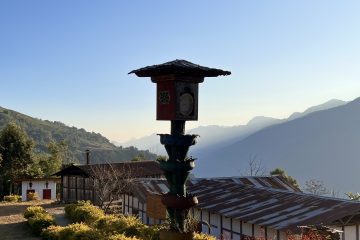“Brevity is the soul of wit.” While Polonius’ use of this famous idiom in Shakespeare’s Hamlet is highly ironic given his verbosity, the maxim is apt enough.
To me, proverbs embody the pith of this Shakespearean saying. They are these truth-rich, bite-sized linguistic delicacies that bring much satisfaction to the user. In both casual and formal rhetoric, proverbs and sayings lend a certain amount of legitimacy and wisdom to the conversation that enthralls the listener while rendering crystal clear the essence of the dialogue.
Thus, as a proverb-phile, I bring to you the following anthology of select Bhutanese proverbs. These time-tested aphorisms accentuate the deep wisdom of our forefathers, and delight me with their no-nonsense approach to life. I hope you will agree, and comment your favorite proverb down below!
སློབོ་ཚིག་ཐག་ཐུངན་ཉན་གོ་བདེ། ལམ་སྐོར་ལམ་ཉུངན་འགྱོ་གོ་བདེ།
The less verbose the dialogue, the easier it is to listen. The less serpentine the path, the easier it is to walk it
་
I wanted to start with this because it is a Bhutanese equivalent of Shakespeare’s “brevity is the soul of wit” saying. I find it helpful to bring this out when my WeChat group chats get too noisy, especially with one person doing all the talking in a meandering, beat-around-the-bush sort of way!
མགུ་དང་བྱག་འཐབ་ཁུངས་མེད།།
It is useless to butt your head against the cliff.
Sometimes circumstances are such at there is nothing one can do about it. As the saying goes, if you can solve the problem at hand, great, don’t worry. If you can not solve it, why worry? Of course, the implications of not solving the problem could be dire, but you get what I mean. After all, it is not a one-size-fits all maxim. Thus, I think it requires a certain level of tack to use these proverbs in the most wanting circumstance to levy the full charge of its meaning.
ཁ་གིས་ཨ་བ་ཟ། །མཆོ་ཏོ་དར་གྱིས་འཕག།
Cleaning the beak with silk while eating scat with the mouth
We are human, and humans have conflicting emotions and desires. But as we grow into adults, it is important we prioritize certain feelings and duties above others. When we feel that someone is a acting inconsistently with his words, please feel free to flash this wonderful wordplay!
དམའ་བ་ལུ་མ་སྡང་། །མཐོ་བ་ལུ་མ་འགྲན།།
Contemn not the lowly. Contend not with the rich and the powerful.
This is a characteristically Bhutanese proverb. As a society that deeply values harmony and compassion, it beseeches one to be compassionate on the less-fortunate. It also encourages obedience and deference to those higher up the rungs of society. At the same time, it is a wise adage: back in the unenlightened old days of fiefdoms, contentious and rebellious behaviors didn’t get our forefathers anywhere. Thus, they leaned to adapt to the zeitgeist.
འཐུས་ཤོར་ལན་ཅིག་བྱུང་ཚེ་སྐྱོ་སྐྱོཝ་མེན། །དེ་ལས་ཡོན་ཏན་ཐོབ་ཚེ་མཁས་པ་ཨིན།།
Failing once does not make one a loser. Learning a lesson from the failure makes one wiser
How re-assuring! One may say this is for the more philosophical types who want to take refuge in the inevitability of things. In a sense, this is a Bhutanese equivalent of Murphy’s Law that whatever can do wrong will go wrong. Brilliant, isn’t it? However, this specific saying takes it one step further: it is necessary one learns from the mistakes. Otherwise, one is just a fool.
སློབོ་མི་སླབ་མནོ་སར་སླབ་དགོ། །མི་མི་རེ་མནོ་སར་རེ་དགོ།།
That which seemed unnecessary to speak out might have to be spoken. He who seemed unhelpful might have to be relied on.
At the risk of appearing verbose myself, I have managed to make my translation of this proverb rather long. But isn’t that true, now? Sometime, we have to have difficult and unexpected conversations with people around us much to our surprise and discomfort. And at times, the most unexpected, random stranger, or someone who we thought we will never have to ask for help from, proves to be the most helpful being in the universe. This is such a wise saying, and inwardly, it encourages one to be diplomatic, civil and caring towards all.
གསེར་རྔའི་རྡུང་སྐད་འཐོན་དགོན །ཤིང་གི་རྔས་ཏོ་ཕར་བླུགས་དགོ།།
For the Drum of Gold to give its music, it must be beaten with the wooden drumsticks.
This proverb means a lot of things. I find it useful to analyze systems: For the wonderful, gleaming “machine” to work its magic, its cogs must turn. Without the people working in a system/company, it is not going to produce any meaningful output, however magnificently it is set up. Neat!
ཁ་བཤད་ཆུའི་ལྦ་ཀ །ལག་ལེན་གསེར་གྱི་ཐིགས་པ།།
Words resemble foam in the water. Action resembles drops of gold.
I try to hold this adage dear. It stresses the importance of action vs merely ideating and dreaming. Yes, everything is better said than done but proactive actions can get things accomplished, however difficult. On the other hand, merely talking without doing constitutes a farce.
མི་གིས་རྒྱུ་ནོར་མཐོང་རུང་གནོད་པ་མི་མཐོང། །ཉ་གིས་ཟ་ནི་མཐོང་རུང་ལྕགས་ཀྱུ་མི་མཐོང།།
People see the goodies but not the consequences. The fish sees the worm but not the hook.
In Buddhism, desire is the cause of all sufferings. We tend to see the shiny, glittering things we want to get, but fail to comprehend that there may be consequences later – just like a fish sees a worm dangling tantalizingly in the water. Going for it, it is grabbed by the unfeeling hook and later devoured as feasts.
བྱ་བ་ཐེངས་ཅིག་ཉེས་ན་ཉེསཔ་མེན། །ཚེ་ཅིག་གཏན་གྲོགས་ཉེས་ན་ཉེསཔ་ཨིན།།
Committing a mistake once will not finish you, but having the wrong partner in life will.
You can say that behind every successful person, there is a wonderful partner. While mistakes in many areas can be committed with not-so-grave consequences (many exceptions, of course), finding the wrong partner in life can cause people to lose priority in life and stagnate. And I think that given the importance played by the support and love of one’s partner in determining the outcomes of a married person’s life, this is truly a wise dictum ringing across the generations and into the ears of us youngsters in the 21st century.
These are but a mere inkling of the ocean of wisdom that comprise the entire gamut of wise Bhutanese proverbs and saying. For you my Bhutanese chums who are interested to learn these wonderful tricks of rhetoric, please feel free to check out this superb compilation by the Dzongkhag Development Commission.



0 Comments